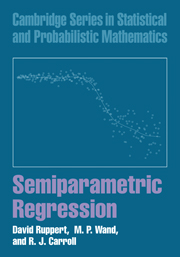Book contents
- Frontmatter
- Contents
- Preface
- Guide to Notation
- 1 Introduction
- 2 Parametric Regression
- 3 Scatterplot Smoothing
- 4 Mixed Models
- 5 Automatic Scatterplot Smoothing
- 6 Inference
- 7 Simple Semiparametric Models
- 8 Additive Models
- 9 Semiparametric Mixed Models
- 10 Generalized Parametric Regression
- 11 Generalized Additive Models
- 12 Interaction Models
- 13 Bivariate Smoothing
- 14 Variance Function Estimation
- 15 Measurement Error
- 16 Bayesian Semiparametric Regression
- 17 Spatially Adaptive Smoothing
- 18 Analyses
- 19 Epilogue
- A Technical Complements
- B Computational Issues
- Bibliography
- Author Index
- Notation Index
- Example Index
- Subject Index
19 - Epilogue
Published online by Cambridge University Press: 06 July 2010
- Frontmatter
- Contents
- Preface
- Guide to Notation
- 1 Introduction
- 2 Parametric Regression
- 3 Scatterplot Smoothing
- 4 Mixed Models
- 5 Automatic Scatterplot Smoothing
- 6 Inference
- 7 Simple Semiparametric Models
- 8 Additive Models
- 9 Semiparametric Mixed Models
- 10 Generalized Parametric Regression
- 11 Generalized Additive Models
- 12 Interaction Models
- 13 Bivariate Smoothing
- 14 Variance Function Estimation
- 15 Measurement Error
- 16 Bayesian Semiparametric Regression
- 17 Spatially Adaptive Smoothing
- 18 Analyses
- 19 Epilogue
- A Technical Complements
- B Computational Issues
- Bibliography
- Author Index
- Notation Index
- Example Index
- Subject Index
Summary
Introduction
The final draft of this book was written in 2002 and reflects our priorities and views on semiparametric regression at that time. However, the interplay between statistical methodology and applications is currently in a dynamic state. We hope that our coverage of the main ideas of semiparametric regression will serve as a reasonable basis for whatever new directions semiparametric regression takes. In this closing chapter, we note that the approach to semiparametric regression used throughout most of the book can be distilled into just a few basic ideas. We also mention some notable omissions and comment on future directions.
Minimalist Statistics
One of the major themes of this book is the use of the mixed model framework to fit and make inferences concerning a wide variety of semiparametric regression models, though we have intentionally used both the mixed model and more classical GCV methods in our examples. This approach has the advantage of requiring little more than familiarity with mixed model methodology, as outlined in Chapter 4 and Section 10.8. In particular, fitting is achieved through just two fundamental and well-established principles:
(1) estimation of parameters via (restricted) maximum likelihood; and
(2) prediction of random effects via best prediction.
If there is an important scientific exception to the basis model – such as a predictor being subject to measurement error – then these principles can still be used for fitting, as demonstrated in Chapter 15. However, as seen there and in Section 10.8, maximum likelihood and best prediction are sometimes hindered by the presence of intractable integrals.
- Type
- Chapter
- Information
- Semiparametric Regression , pp. 320 - 325Publisher: Cambridge University PressPrint publication year: 2003



